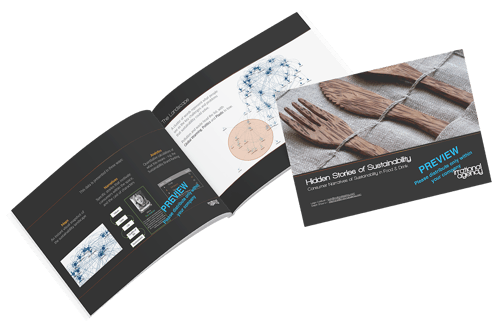
The Pros and Cons of Industry Trend Reports
 Irrational Agency
Irrational Agency
Are you interested in sustainability? Cryptocurrency? Whether consumers trust you to collect data about them, and the AI algorithms that process it? How the post-COVID world will be different: hybrid working, digital retail, new approaches to health and wellbeing? Digital marketing, renewable energy, travel, and security in a changing world? Whatever might be changing in the economy and business, there’s a good chance someone has written a report about that trend. And if you’re lucky, there might be one that tells you how these issues will play out in your own industry: whether that’s energy, automotive, food & beverage, travel, or retail.
Industry trends are patterns in things like pricing, costs, consumer behavior, both new and arising consumer narratives, and other factors that may change in a certain industry. Most trend reports are broadly about a current hot topic and they tend to explain an issue at hand with some observations which is a great way to get insights into what is happening in your market. When deciding if an industry trend report is right for you, there are a few things to keep in mind.
First of all, make sure you understand the scope of the report. What is included and what is not? Is it only listening to specific voices, or is it considering everyone involved in the market? Also, be sure to review the methodology used to produce the report - quantitative, qualitative insights or mixed? How was the data collected and analyzed? Finally, ask yourself if the insights provided will be relevant to your business.
Irrational Agency is an advocate of industry trend reports but we do recommend caution when choosing what to purchase. Below, we explore both sides of the coin in more detail.
Pros
- FACILITATE INDUSTRY-WIDE COORDINATION: Industry reports help form an industry consensus. For example, let’s say PwC, the world's second-largest consulting firm, puts out a report on the crypto industry. You can assume that because of PwC’s position in the consulting world, many CEOs in the crypto world will read this report. Given this, they'll all be on the same page about where the industry is and where it's heading meaning that each fintech CEO will be adapting to these trends in parallel, resulting in industry-wide coordination.
- HELP YOU IDENTIFY BUSINESS OPPORTUNITIES: Being up-to-date with the latest trends in customer behavior will help you identify new business opportunities that may have otherwise flown under the radar. For example, if you're in the fashion industry and a trend report indicates that the use of sustainable cotton is on the rise, you could consider implementing those changes for your brand.
- GIVE A HEAD START ON INSIGHTS: Trend reports will provide a head start on industry insights without having to conduct any research. You get solid research-driven data you can rely on (even though it's generic) and can enjoy having a baseline sooner than if you were to try to pull it together.
- COST-EFFECTIVE: Trend reports typically come with actionable insights, so you can get the most out of your investment. Additionally, whoever's creating the report is sharing the cost among multiple users so the cost is usually less than if you commission your own research.
- HELP MAKE INFORMED DECISIONS: Data in these reports allow you to learn from others in your industry. It may be that there are other sectors where people are already ahead of you. For example, if you're considering entering a new market, a trend report can help you understand the potential risks and opportunities involved that others are already dealing with.
Cons
- GENERIC INSIGHTS CAN BE LESS USEFUL: Many times, the information in trend reports is broad and not specific enough to answer specific questions about your company, sector, or category. The insights are typically generic and high-level and will likely require additional research to fully apply to your business.
- IGNORING NON-CONSCIOUS LEVEL: Usually, the methodologies used in trend reports are very rational and straightforward (like questionnaires). This means that they take responses at face value and don't take into account response bias or the nonconscious level, which is essential when it comes to trendspotting (e.g. what's the emotional trend?).
- LACK OF RELIABILITY/ACCURACY: These reports cannot anticipate external factors that disrupt developing trends in consumer behavior - perhaps a shopper trend starts but develops differently because of something completely unrelated (e.g. COVID-19) or a hidden consumer narrative (e.g. the two-faced coin that is sustainable travel).
- FOCUSED ON COMPANIES, NOT CONSUMERS: Many industry reports are based on interviewing company executives - so you can find out what other companies are doing. But maybe you’d rather find out what your actual customers think?
Irrational Agency publishes a quarterly industry trend report called the Hidden Stories report. Using nonconscious research methods, we're uncovering unconscious, hidden stories. We're listening to what consumers are saying and deciphering what that really means - this way, we are able to get a deeper level of insight than traditional research methodologies. These stories provide a new, specific, and rich type of insight that goes way beyond what you might have seen in typical generic trend reports before.
We are also offering subscribers the ability to ask their own questions and bring their own topics of concerns/priorities into the research process. Subscribers can work with us to build their own particular topics into the research methodology. For example, we've been working with a retailer in the UK that is very interested in understanding food waste and where consumers place the responsibility for food waste: do they see it as the retailer's fault, or do they see it as their own responsibility? We built that into our understanding of the general sustainability attitudes across the food and drink world and into the sustainability report we published. But the concerns of consumers and companies in the finance or tech world are different from those in food and drink: so we’re collecting fresh data and asking different questions for our subscribers in those industries.
Industry trend reports can be great sources of information for businesses. However, there are some things to consider before purchasing one. A lot of these trend reports are based on data based on interviews with CEOs and other company executives, so you are finding out what other companies are doing. But Irrational Agency's Hidden Stories report is based on data directly from consumers. You get to hear about trends straight from the mouths of consumers and learn what will drive demand over the coming years.
Download the preview and see for yourself!

